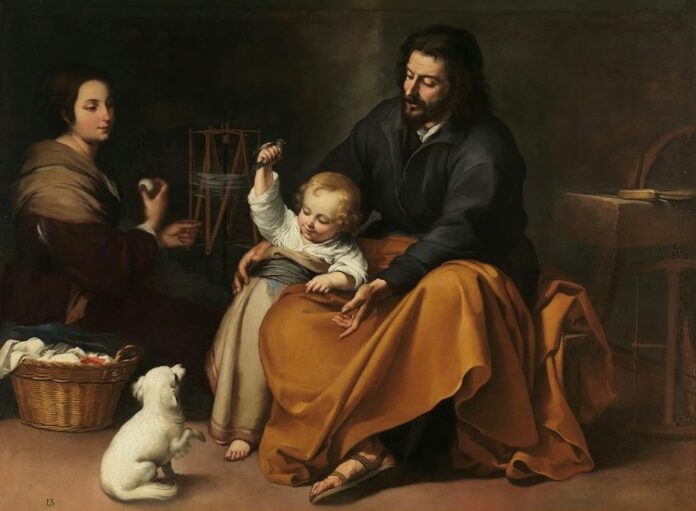The head of the Holy Family, terror of demons, and protector of the holy Church – St. Joseph – enjoys the rare liturgical feat of having two annual feasts celebrated in his honor. The first and higher of these is the Solemnity of St. Joseph, Spouse of the Blessed Virgin Mary, on March 19; the second is the Feast of St. Joseph the Worker on May 1.
It is appropriate that the solemnity should take priority, since before he was a laborer – before even being the foster father of the Son of God – Joseph was first and foremost a husband. His vocation defined the path his life took. Joseph is a man whose priorities were properly ordered and integrated into his daily actions.
He was the husband of Mary. In marriage, he was linked not only to her, but to her Son as well, raising Him as his own child. And in order to provide for his family, he worked. Two possible occupations are offered us via the traditions of the Church Fathers, saying he was either a carpenter or an ironsmith. To me, the carpenter tradition seems to hold more water as we read in the Gospels: “Is [Jesus] not the carpenter’s son?” (Matthew 13:55). There is also some divine poetry in that the Son of God, destined for the wood of the Cross, grew up working with wood under Joseph’s tutelage.
If it was either of these, Joseph’s work day was likely not your average 9 to 5. And neither was he a farmer, fisherman, or soldier. The influx or trickle of work he received resembled the nature of a modern-day migrant laborer or a digital freelancer: there was work to do, but there was no guarantee of how much or for how long. He was subject to the whims of whoever asked him to craft something from wood or to remedy tools warped from use.
In this matter of not knowing what each day holds, Joseph would have placed his trust in God who gives all His creatures “their food in due season” (Psalm 145:15). Little could he guess he lived out the words of His Son’s ministry in adulthood: “Therefore I tell you, do not worry about your life, what you will eat [or drink], or about your body, what you will wear…” (Matthew 6:25). But one aspect we need hardly speculate on is whether or not Joseph worked hard. He indeed did. Otherwise, the Holy Family would have starved.
History is full of what society might deem honorable people. So what particular merit is there in examining the virtues of St. Joseph? The answer is given us in Scripture. Matthew 1:19 calls Joseph “a righteous man.” If the inspired and inerrant written word of God confirms that Joseph is good and holy, then his example can be a guiding light for me to grow in goodness and holiness.
St. Joseph serves as an icon not of traditional but of authentic masculinity, of a life lived rightly. A Josephite life is a virtuous life. Let’s explore five manly virtues displayed by St. Joseph, the proofs for which are predominantly found in Scripture.
Humility
Like all of us, Joseph had plans for his life, and they probably didn’t entail marrying the Mother of God, being the parent to a Son not his own, and fleeing the country to safeguard the Christ Child. Yet, he accepted all of these things. He loved doing God’s Will, he loved Mary, and he loved Jesus more than he loved his own interests. It took humility to accept that he did not understand everything that was happening, that he was not in control of everything, and that his world was in the process of being turned right side up again. Life is not about the self but about others. Joseph, humbled, accepted his vocation and, with a little help from an angel (Matthew 1:20-24), welcomed the pregnant Mary into his home.
Obedience
Again and again, Joseph displayed the virtue of obedience to authority (especially to God’s will, manifested, for example, in the decree from Caesar Augustus), a precious attribute so uncommon in today’s culture of revolutionary individualism. Joseph often heard God’s Will directly from an angelic messenger in a dream. This happened before bringing Mary into his home, before fleeing Bethlehem and traveling to Egypt, and before leaving Egypt to return to the land of Israel. Every time, Joseph obeys the calling.
Courage
Significant parts of Joseph’s life involved his accepting the unknown. It would have been easy for most men to fall into fear, the kind of fear that immobilizes a person. But Joseph persisted in being a courageous man of action. Welcoming the love of your life into your home when she carries a Child who isn’t yours, traveling to a foreign country and leaving your home behind, returning to your own country while still worrying about the powers that be…these are acts of bravery.
Silence
Joseph would not be such a man of resolve, peace, and divine intimacy if he did not observe silence. Scripture gives us no direct quotations from the man. He is a rather quiet figure. But the Bible confirms he must have spoken one word: “He had no relations with [Mary] until she bore a son, and he named him Jesus” (Matthew 1:25). Joseph undoubtedly uttered the sacred Name of Jesus!
As Proverbs 17:27 says, “Those who spare their words are truly knowledgeable, and those who are discreet are intelligent.” Joseph certainly spared his words – a man of introspection much like his wife who pondered the words and actions of her Son Jesus within her Immaculate Heart. The lack of noise enabled him not only to be a man of introspection but of the interior life with God. Both audibly and internally, he could call on the Name of Jesus and make his very heart God’s home.
Affection
What I will here call the virtue of affection is not an attribute that Joseph overtly displays in Scripture. I direct the reader’s attention instead to a very old prayer to Joseph which, in recent reprintings, has included the note that the devotion is over 1900 years old. If that is so, then the devotion is nearly as old as the Christian faith itself. Part of the prayer goes like this:
Oh St. Joseph, I never weary contemplating you and Jesus asleep in your arms. I dare not approach while he reposes near your heart. Press him in my name and kiss his fine head for me, and ask him to return the kiss when I draw my dying breath.
True affection is charity. This love needs to be shown, not merely stated. This prayerful image of St. Joseph offers us what a father should be for his children, a loving comfort and support. He is affectionate with his adopted Son. For all the biological and foster fathers out there, Joseph is the prince and paragon of patriarchs. And he did not shy away from manly affection. Like the Good Father of the Prodigal Son, we are called to be men who embrace our children and kiss them. A good father, like St. Joseph, will show his children how to love so that they can truly live.











